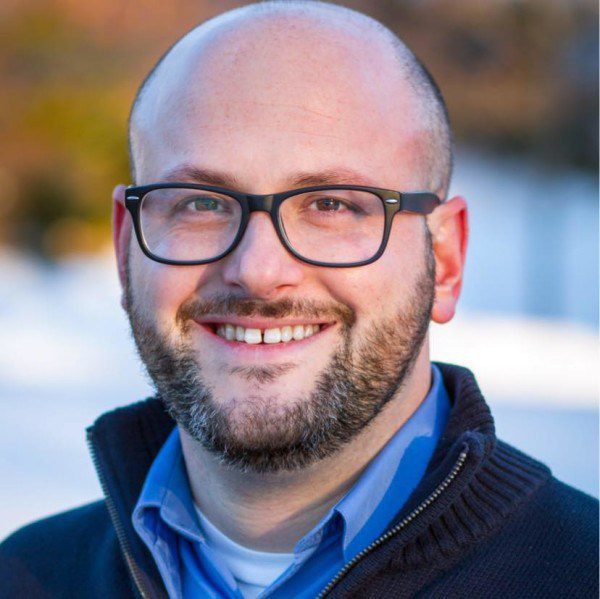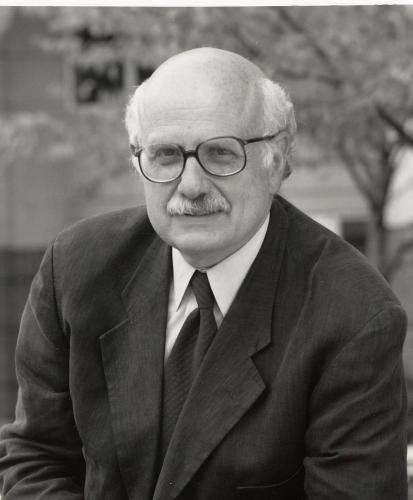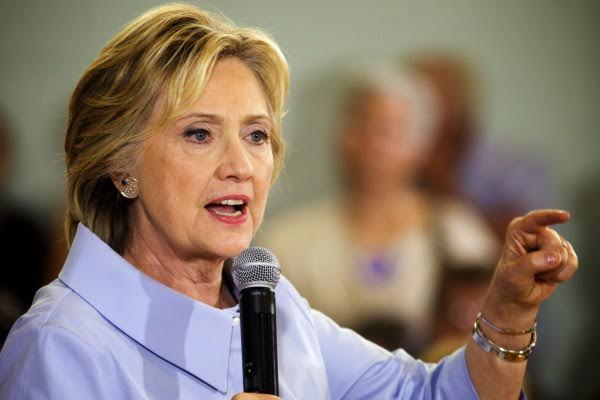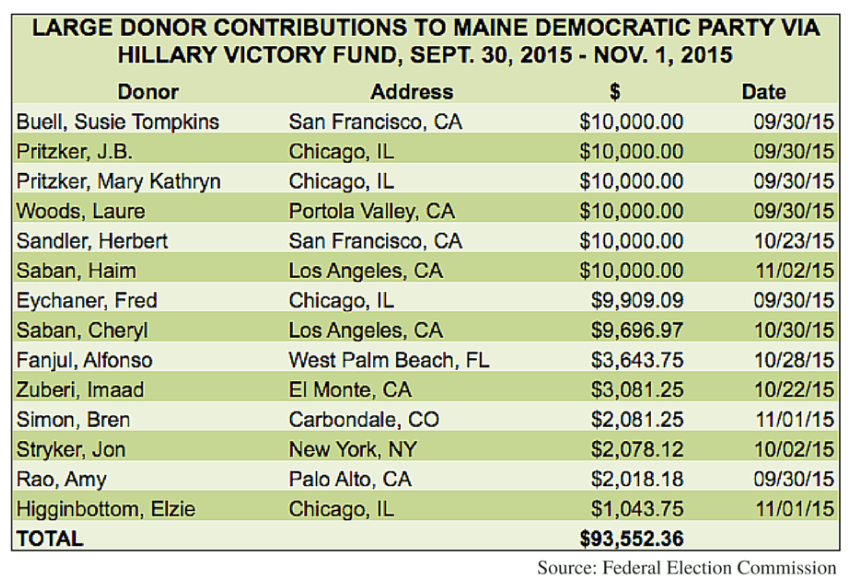A Cuban-born sugar tycoon. A California-based registered foreign agent for the government of Sri Lanka. A Chicago billionaire.
All of them are recent large donors to the Maine Democratic Party via a complex fundraising scheme called the Hillary Victory Fund. The fund exploits recent court decisions and weakened campaign finance laws to maximize political contributions and funnel them to the Democratic National Committee.
Among contributors to the Maine Democratic Party via the Hillary Victory Fund is Chicago billionaire and Hyatt Hotel heir J.B. Pritzker, who gave $10,000 in September. His wife, Mary Kathryn, also gave $10,000. Alfonso Fanjul, the West Palm Beach sugar tycoon born in Cuba, gave $3,644 in October. Southern California entertainment magnate Haim Saban gave $10,000 to the party in November. His wife, Cheryl, gave $9,697 in October. And the Sri Lanka foreign agent, venture capitalist Imaad Zuberi, gave $3,081 the same month.
They’re among 14 out-of-state wealthy donors who gave $93,552 to the Maine Democratic Party since mid-September of last year. Six of the 14 donors gave $10,000 — the annual maximum for state party contributions from individuals — during the last three months.
But all the contributions haven’t stayed in Maine, or any of the other state Democratic parties to which Hillary Victory Fund donations have been funneled. Federal Election Commission reports show that the two October and November transfers totaling $39,000 from the Hillary Victory Fund to the Maine Democratic Party each sat for less than 48 hours with the party and then the exact same amounts were transferred to the Democratic National Committee, or DNC.
According to the Alaska Dispatch News, the Alaska Democratic Party performed a similar function and took in $43,500 from the Hillary Victory Fund and quickly transferred $43,500 back to the DNC. And the Huffington Post has reported that “22 of the state parties linked to the Hillary Victory Fund have received $938,500 from the fund and sent the same amount back to the DNC.”
While individual contributions to the state and national parties are capped, transfers between state and national committees are unlimited. That means that, effectively, donors can skirt contribution limits to the DNC or state parties by giving through joint fundraising committees like the Hillary Victory Fund.
One-stop shopping for big donors
When asked why the Maine Democratic Party was working with the Hillary Victory Fund to get donations from out-of-state wealthy contributors, the party’s Executive Director Jeremy Kennedy first said, “Maine decided to go into it because the money would go to strengthen state parties. I think that is something we wholeheartedly support and endorse.”
But when asked later why the party had sent the money back to the DNC, Kennedy said that the money was transferred because “the DNC is our umbrella organization that ensures strong state parties across the country.”

The contributions to Maine and other states have come after Congress and the Supreme Court, in its 2014 McCutcheon decision, weakened campaign finance restrictions that limited individuals to $123,000 in contributions over a two-year election cycle. Now that limit is $1.3 million over the election cycle.
“All of a sudden a presidential candidate from either party has the ability to raise, to solicit huge contributions at the six- and seven-figure level, when candidates were simply not permitted before the decision to raise those kinds of huge contributions,” said Fred Wertheimer, head of Democracy 21, which works to “eliminate the undue influence of big money in American Politics.”
Those contributions are solicited through a so-called “joint committee,” formed by candidates, the national party and in some cases, state parties. It’s one-stop shopping for big donors: The committee can solicit one large contribution that is then divided among each of those entities.
During the 2012 presidential campaign, both Barack Obama and Mitt Romney’s campaigns operated joint committees after they got their party’s nomination. But those were subject to the lower limits.
In an unusual move, Hillary Clinton’s campaign formed the Hillary Victory Fund even before the Democratic Party nomination in the presidential race has been decided. The committee jointly fundraises for the DNC, the Hillary Clinton campaign and 33 state Democratic parties.
Contradicting party values?
The Maine Democratic Party says on its website, in a section titled “Ethical Government and Democracy,” that, “We believe in a government that is ‘for the people’ and ‘by the people’ not ruled by big corporations and the ultra wealthy.”
Kennedy, who worked on the Hillary Clinton presidential campaign in 2007-2008, said that working alongside the current Clinton campaign to maximize donations from the wealthy didn’t contradict the Maine party’s values.

“From my standpoint we are always looking to enlarge our donor base and bringing more donors in to support our party,” said Kennedy. “It’s not giving more power to the individual to accept their donation, it’s spreading the power among more donors.
“The money we raise for those campaigns is in hopes of making the state of Maine the best place to live for our families.”
Andrew Bossie, head of Maine Citizens for Clean Elections, said that the increased fundraising wasn’t good for democracy.
“Any time that a wealthy few … can contribute large amounts of money into the hands of parties, candidates, political groups, that comes at the expense of everyday people being able to have their voices heard,” said Bossie.
“There’s a lot of cynicism out there when half of our country doesn’t go out to vote because they don’t believe their vote counts.”
Maine Republican Party Director Jason Savage said that his group has “no concrete plans” to mount a joint fundraising effort at this point.
“It’s not an appropriate thing to do at least until we have a nominee,” he said. But “we also haven’t done anything to rule that out” after a nominee is chosen.
And Bernie Sanders, Clinton’s chief rival for the Democratic nomination, also operates a joint fundraising committee with the Democratic National Committee, but that group has not raised money to benefit state party organizations.








